AN ELEKTRA WITHOUT ELEKTRICITY
The first show I ever reviewed in Chicago was The Hypocrites’ All Our Tragic at the Den Theatre, a marathon twelve-hour distillation of every surviving Greek tragedy. It was an extraordinary experience. I’ve also seen a one-night performance of the complete Oresteia of Aeschylus and read both Sophocles’ and Euripedes’ versions of Elektra. To sum up, I was fully prepared to love Richard Strauss’s operatic version. And I was getting excited remembering Lyric’s production of the German composer’s Der Rosenkavalier two seasons ago starring Amanda Majeski.
Elektra, both the opera as written by Strauss and the production as performed at Lyric, are both flawed and neither seems to have found its footing, figuratively and literally. To begin with, the polar vortex we had last week prevented the company from staging a full dress rehearsal. Despite this minor setback, everything went rather smoothly. At the outset, it was announced that the opera’s star, Nina Stemme, making her Lyric debut, had injured her knee; she would still sing, but her movement would be somewhat restricted. Seeing her moving about rather stiffly on the uneven set and worrying that she would fall again added unnecessary tension to the already hair-raising drama.
A one-act opera utilizing a libretto by Hugo von Hofmannsthal, Elektra runs a relatively condensed and compact 100 minutes without intermission. Where you might expect a punchy, hard-hitting tragedy, you get instead a disjointed, anticlimactic Danse Macabre, but without the dance. Famed for its psychological depth, the story leaves too many questions unanswered. Why, for example, is Elektra and her revenge the focus of the opera when it is her brother Orest who actually gets the revenge by killing their mother Klytämnestra? Why does Elektra fail to give to Orest their father Agamemnon’s axe for use as a murder weapon? And why do we only witness Orest killing their mother’s lover Aegisth and not Klytämnestra herself?
Strauss’s score contains some incredibly beautiful, powerful and harrowing music that veers into the atonal. And because the music is so loud overall the vocal lines tend to skew towards the upper range so as to be heard, which begins to grate on the ear. Moreover, the violence of the massive brass section at times threatens to overwhelm the singing. Indeed, conductor Donald Runnicles fails on occasion to keep the orchestra from drowning out the soloists.
It’s hard to judge Nina Stemme’s performance objectively because of her injury, which could have sapped some of the strength and energy needed to do fully conjure her character’s fury. Her dramatic soprano certainly had the power to sustain itself throughout the entire opera, despite the high tessitura and blaring orchestration. Elza van den Heever as Elektra’s sister Chrysothemis adds a welcome breath of fresh air to a rather dull and drab production with her light and lissome voice. Michaela Martens made a rather horrific Klytämnestra, whose grotesque costume and makeup distracted too much from the enjoyment of her magnificent mezzo-soprano.
Scottish bass-baritone Iain Paterson’s Lyric debut as Orest was rather disappointing. primarily due to his voice’s lack of clarity. Fortunately, Robert Brubaker’s debut as Aegisth more than made up for it, despite his brief appearance. And first-year Ryan Opera Center member Eric Ferring made a stunning and extremely promising debut as Young Servant with his strong, beautifully clear tenor.
Original Director Sir David McVicar’s production was much like his earlier dark, monotone productions of Il Trovatore and Wozzeck. I’m beginning to wonder if this is the kind of aesthetic he favors or if this is the only way he knows how to do things. John Macfarlane’s set and costume designs don’t illuminate things any further, for his artistic vision is wildly eclectic. The set is basically a pile of rubble, with the crumbling palace leaning forward at a disconcerting angle, which makes no narrative sense. The costumes range from the vaguely classical (Chrysothemis’s gown) and medieval (the hood of Orest’s Tutor) to the ninja-like guards and bald, African-inspired court of Klytämnestra. There is at least one thing I loved about the production, however, that I would be remiss to omit: the blood of Klytämnestra dripping copiously down the palace steps. Creepy and genius.
Part of me still wants to like Strauss’s Elektra, even this Lyric production of it, but the more I think about it and ponder it, the less satisfying it really is/was. I still find it a fascinating story and grow in appreciation for Strauss’s score, but I can only conclude that much of the opera’s appeal lies in its brevity and adventurous orchestration. Some of the flaws in this production are entirely accidental and will be smoothed out in subsequent performances, but others are intentional and will remain.
photos by Robert Kusel from 2012 production
Elektra
Lyric Opera of Chicago
Civic Opera House, 20 N. Wacker Drive
ends on February 22, 2019
for tickets, call 312.827.5600 or visit Lyric Opera
for more shows, visit Theatre in Chicago
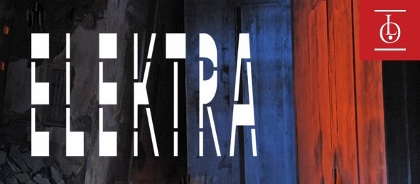
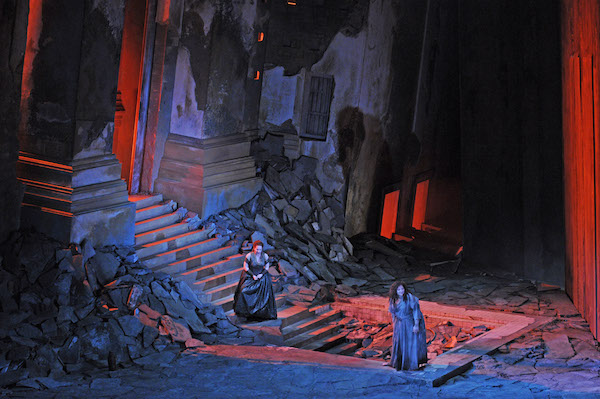
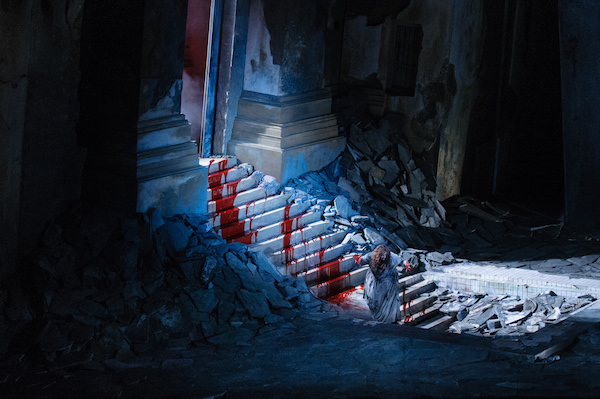
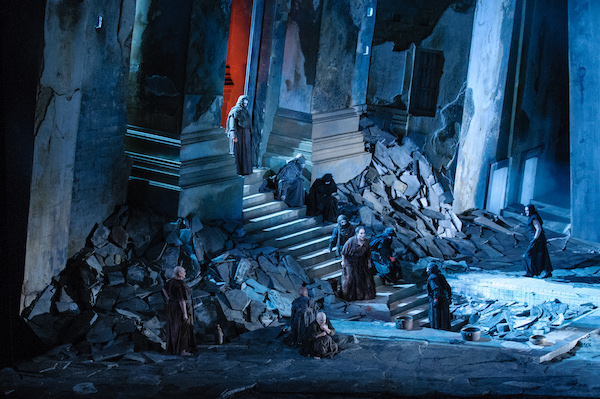
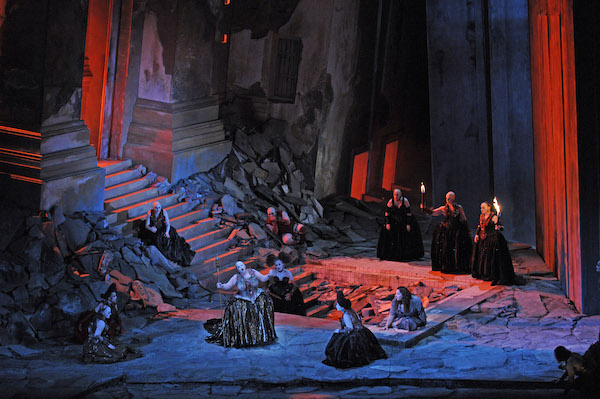

{ 1 comment… read it below or add one }
I saw the Monday evening performance. It did begin as a drab presentation, but grew in strength and intensity. For me, it was very moving as I saw the shade of Sophocles move across the scenery and the spirit of ancient Greek drama illuminate a dark unlovable condition. The orchestra prevailed as the Greek chorus, perhaps too loud at times, but purposeful in its modernist tonal atonal evocation. For her first bow, Stemme (Elektra) stood alone in the center of the stage and brought the house down. We did not let her go.